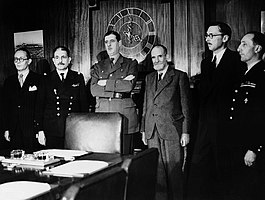French National Committee | |
|---|---|
committee of Free France | |
 | |
| Date formed | 24 September 1941 |
| Date dissolved | 3 June 1943 |
| People and organisations | |
| CNFL President[1] | Charles de Gaulle |
| Deputy head of government | René Pleven |
| Status in legislature | none |
| Opposition cabinet | Government of Vichy France |
| Opposition party | |
| Opposition leader | |
| History | |
| Predecessor | |
| Successor | |
The French National Committee (French: Comité national français, CNF) was the coordinating body created by General Charles de Gaulle which acted as the government in exile of Free France from 1941 to 1943. The committee was the successor of the smaller Empire Defense Council.[2][full citation needed]
It was Winston Churchill who suggested that de Gaulle create a committee, in order to lend an appearance of more constitutionally based and less dictatorial authority.[3] According to historian Henri Bernard [fr], De Gaulle went on to accept his proposal, but took care to exclude all his adversaries within the Free France movement, such as Émile Muselier, André Labarthe and others, retaining only "yes men" in the group.[3]
The CNF was founded 24 September 1941 by an edict signed by General de Gaulle in London. The committee remained active until 3 June 1943, when it merged with the French Civil and Military High Command headed by Henri Giraud, becoming the new French Committee of National Liberation.

